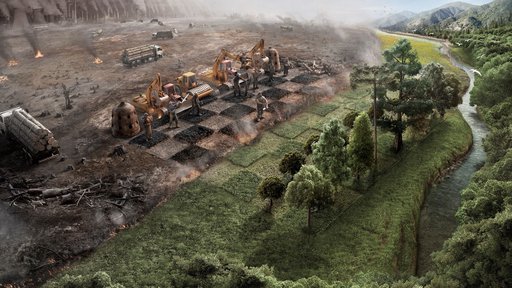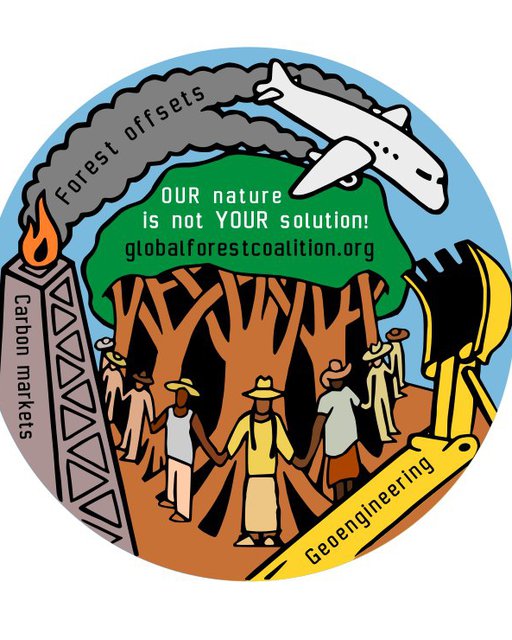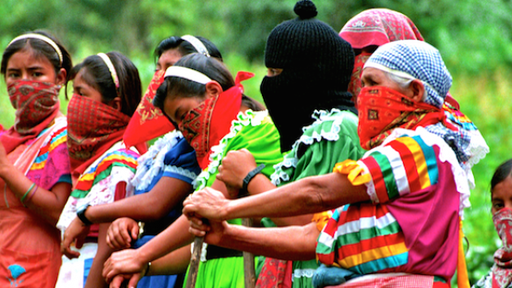#NatureNeedsJustice
Capitalism can only sustain itself if it grows constantly, that's why it is consistently moving further into new sectors to commodify and sell whatever can be sold for profit. In the past years nature conservation became one of these new frontiers to be exploited. In the mainstream commodification of biodiversity is presented as a solution to the extinction crisis of species - around 130 animal and plant species are going extinct every day – even though capitalism and extractive industries are the cause of the extinction of species.
As a movement we support climate actions only if they focus on justice and similarly, we support justice in Nature conservation! In many national parks for wildlife protection, particularly in the Global South, Indigenous people who previously owned these lands were kicked out or even killed to create these parks. We should be aware that 80 % of the world's biodiversity is found on the lands of Indigenous peoples, because they generally maintain lifestyles that put less stress on ecosystems than people living high-consumption lifestyles of industrialised societies.
A systemic change is needed. Climate "Solutions" like CO2-Offsets, "Natural Climate Solutions" or "green capitalism"-projects try to solve the ecological problems with the tools which created them. This will not work if nothing is done about the constant growth of industries and consumerism of people in the Global North who are responsible for biodiversity loss at global scale.
As part of the #NatureNeedsJustice campaign we want to reflect how our group of Global North activists can take responsibility and become a useful allies to justice struggles of the Global South. The campaign aims to spread awareness that nature conservation even today is often very colonial and racist. We want to highlight initiatives and solutions – particularly led by people in the Global South - that protect human rights and biodiversity at the same time.
The destruction of the living planet through exploitive industries and overconsumption of the Global North has been a reality in many places of the globe, destroying the lives and livelihoods of Global South communities. Now - for the first time in human history - this destruction is moving from local to global, finally getting the attention of European society at large.
The causes of this environmental destruction are the worldwide dominating economic system based on the ideology of economic growth and the systematic oppression of people due to racism and colonialism. European environmental movements have to tackle those root causes to be able to meaningfully implement demands for #EnvironmentalJustice and push for necessary changes at systemic level.
Engaging in a deeper analysis is the motivation behind the #NatureNeedsJustice campaign. How have colonisation and racism led to the climate and ecological crises? Which role do they still play today – for example when huge land areas are fenced off in the name of "biodiversity conservation" and Indigenous peoples are kicked off their lands?
“We should be the leaders of conservation, not victims of it.”
Archana Soreng from the Khadia Tribe, India - member of the UN Youth Advisory Group on Climate Change
Topics of the campaign
- The journey towards justice in the struggle for a livable future – Decolonization, Allyship and self-reflection
- The racist and colonial roots of nature conservation and its neo-colonial present
- Indigenous communities & biodiversity – securing land rights of communities and giving land back
- 30% by 2030: The “Global Deal For Nature”– why we should critique it and what the alternatives are
- Tackling the real drivers of biodiversity loss and exploitation – from economic growth and overconsumption to alternative economies and systems change
- Commodification and financialization of Nature
- What's wrong with planting trees? – a critical look at Net zero, Offsets, REDD+, Nature Based Solutions
- Turning towards an agriculture which supports life – from industrial agriculture to food sovereignity and biodiversity
- Joining grassroot movements – defending the defenders, dismantling the system together and co-creating alternatives
- Against green extractivism – Why renewables are no solution without system change
- The dangers of environmentalism of the right & eco-fascism – ecology is not reserved for progressives
- So, what should we as activists do?
Humans are part of the living planet and connected to all living beings as part of a huge web of life. Western societies have learned to see themselves as separate and superior to all non-human beings, particularly since the enlightenment. In the Western worldview Nature is considered as something inferior to people, a system to be overcome and dominated by human culture. This granted Western societies the „social license“ to destroy and exploit ecosystems and living beings. Colonisers judged people to be different and inferior to then legitimize their exploitation, murder and enslavement. This thinking of separation and domination over human and non-human nature was also forced upon other cultures by colonialism and continues in the capitalist logic until today.
As humans are part of the web of life our behavior influences ecosystems and climate and vice versa. There never was or is a separation between humans and "Nature" at any time of the human existence. All of us – no matter where and how we live – get all our food, shelter and everyday needs from the natural world, even though most people in Western societies have become alieniated from direct interactions with Nature for growing food or building shelter.
"Why do we want to have these protected areas - so that we can extract and destroy the other 70 % of the earth?"
Moenieba Isaacs, Professor and activist from South Africa
Why this campaign now?
At the next biodiversity summit CBD (Convention on Biological Diversity) in Kunming 2021 the UN will discuss to extend „protected areas“ for nature conservation to 30% of the Earth's land surface by 2030. Some well-known ecologists demand to fence off half of the earth's surface (HalfEarth), even though there is no scientific evidence to support 30 % or 50 %. This proposal raises massive social justice and land rights issues, as Indigenous communities point out. At the same time as stealing land from local communities it will do nothing to address the drivers of biodiversity loss: the over-consumption of people and industries in the Global North which are responsible for biodiversity loss through habitat loss and fragmentation, overfishing, climate change, pollution of atmosphere, soils and water and invasive species.
Our campaign aims to increase knowledge and reflection within Western – particularly white – communities who recently became engaged in environmental justice and climate movements. Taking biodiversity as a starting point we will critically address current buzz words such as green capitalism, carbon offsets and "natural climate solutions", how Nature is commodified and financialized without adressing the core drivers of destruction. The discussion about "protecting Nature" and climate action is not reserved for progressive politics – which focus on justice and human rights – but is also used by politicians, parties and movements which belong to the spectrum of the Right, from Identitarians to eco-fascists (e.g. Patrick Crusius, Pentti Linkola, Madison Grant) .
Decolonization
What is decolonization (in the context of this campaign)? As a group trying to actively learn about this concept we will raise questions such as: how can we as as citizens of industrialized countries help to take care of all living species on this planet and at the same time support the fight for global justice and human rights? First, we want to critically reflect on our own internal dynamics. We will ask ourselves questions about the equal integration of various perspectives and, in the course of the campaign, will deal with “critical whiteness” approaches. We will look at how we reproduce colonial traditions in our work and activism – and how we can meaningfully support marginalized voices in our campaign, in a way that is helpful to these communities. Working towards a more equal integration of perspectives of the Global South and support of environmental justice movements originating in those regions is one of the aims of this campaign.
Background
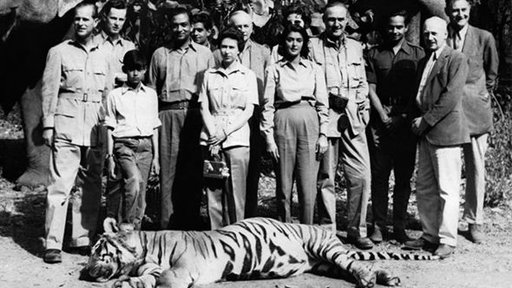
„Nature conservation“ as a field of ecology has a long history of being elitist and colonialist. It started centuries ago in the US with the creation of national parks and the enclosure movement in Scotland: elites decided which areas they deemed worth protecting, removed the local population by force, hunted for pleasure in those reserved areas and closed off the lands to the rural population. This colonial structure persists in biodiversity conservation until today in many regions of Africa, Asia or South America, and partly even in Europe.
Governments and large conservation organizations agree to seal off vast areas of land belonging to Indigenous people and local communities claiming that this was necessary for biodiversity conservation. This type of conservation is called fortress conservation and it is based on the racist misconception that Indigenous or local people cannot be trusted to take care of their own land and the animals living there. In this logic, those people are forbidden to hunt for their own sustenance, while - usually white - tourists can do so for pleasure.

There are many scandalous cases of people being evicted from their own land and being confronted by violent eco-rangers, which has in many cases led to Indigenous people suffering human rights abuses and protests of these communities to defend their rights. Eco-rangers burn down the houses of local residents, steal or destroy their property and beat, torture, rape or kill them. Mostly these human rights violations remain unpunished and in the international press the death of a lion receives more media attention than the death of a human being.
The local population is blamed for the destruction of biodiversity, though they share little or no responsibility for the global loss of species compared to industrialized societies and corporations. According to the scientific community of biodiversity experts the destruction of ecosystems is driven by the material and energy consumption of industrialized societies. Conservation models need to address the growth paradigm of the capitalist economic system (e.g. Convivial Conservation) and/or be part of whole-system approaches embracing justice and plurality (e.g. Radical Ecological Democracy).
80 % of the world's biodiversity (meaning the diversity of all known living species) is living on the land of Indigenous peoples, because they usually maintain ways of life that puts less pressure on ecosystems than industrialised societies. That is why anyone interested in biodiversity conservation should support securing the land rights of Indigenous peoples and local communities.
"Community conservation" approaches claim to work with the local communities, but in reality communities are not always sufficiently involved in setting up and governing the protected area. Free, prior and informed consent of the local communities is the minimum standard all conservation projects must meet. However, all conservation projects should be led by local communities and only be supported by international efforts if the community wants this.
There are already many areas where Indigenous peoples safeguard non-human Nature, sustain the livelihoods of their communities and assert their self-determination, as, to name just as few, the Karen in Myanmar, Tribal Parks of First Nations in British Columbia and ICCAs all over the world. The idea to grant Nature person rights serves as a bridge between Indigenous cosmologies and the legal system originating in Western societies.
“[Indigenous Peoples] are well known to be the first impacted by the loss of biodiversity, by the desertification or climate change and they're nevertheless the guardians of biodiversity.”
Hindou Oumarou Ibrahim - a Mboro from Chad, environmental activist and geographer
Natural Climate Solutions, Offsets and tree planting
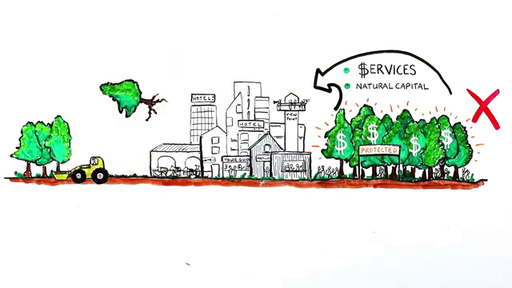
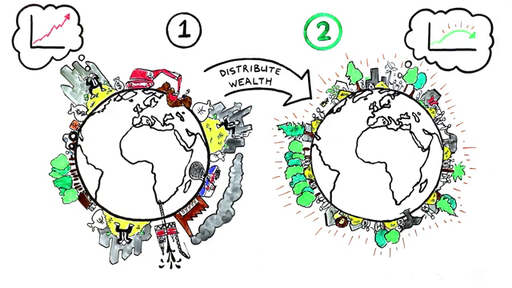
People - predominately in the West - who profit to some degree from the current growth based economic system should be critical towards concepts such as “net-zero” emission promises. Whose defer important, rapid decarbonisation which is needed to help safeguard the lifes and livelihoods of people suffering from the climate crisis now. Major industries driving the destruction of ecosystems and global warming, for example airlines or cruise ship companies, advertise the use of carbon offsets projects (REDD+, forest protection) as compensations for the emissions they cause elsewhere. Many of these projects fail to meet their promises and often suffer from a lack of accountability and community involvement.
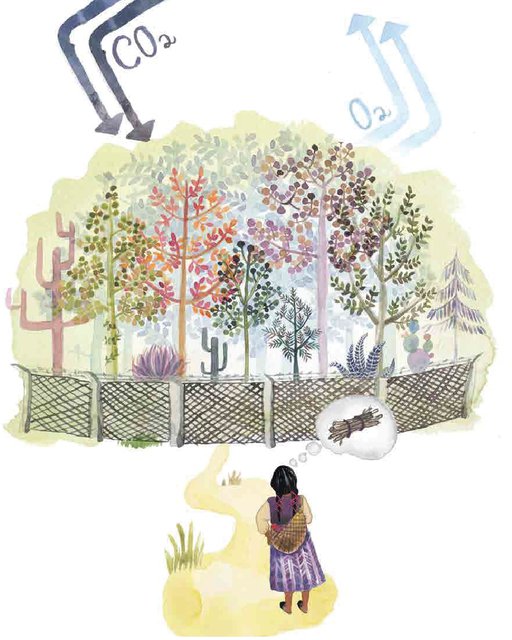
Natural climate solutions, particularly tree planting, are often promoted as a panacea for reducing carbon emissions even though many of the claims are exaggerated or pure myth and often tree planting is promoted only to delay necessary emission reductions right now. On the other hand, restoration of bogs and swamps, reforestation of trees, mangroves or kelp forests are important to slow down the climate crisis and provide habitats for wildlife – but it is important to scutinize how this is done in detail and for what purpose. Generally, these types of restoration or "rewilding" projects raise similar concerns about the ownership of land and democratic, inclusive decision making of local communities. Areas for “ecosystem restoration” are mostly identified in the Global South while industrialised landscapes or farmlands in the Global North are not disputed.
True grassroots initiatives like the Green Belt Movement in Kenya show that tree planting can be sucessful if it is created out of existing community efforts to self-determination and justice, equity and reduction of poverty.
If you are interested in contributing to this campaign, please contact us at presse(at)extinctionrebellion.de
Sources
We would like to share the materials collected on this page in a spirit of support and solidarity.
As a small group, we unfortunately do not have the capacity to research all the contacts and contact the authors, creators and contributors of the materials listed on this page and to ask them explicitly for their permission, to be linked in this context.
If you are the author, creator, or contributor of any of these materials of any of these materials and do not consent to their use in this context, please let us know at presse(at)extinctionrebellion.de and we will remove it.
![[XR] #NatureNeedsJustice](/media/cached_images/224_Dn3zLb4.jpg)
